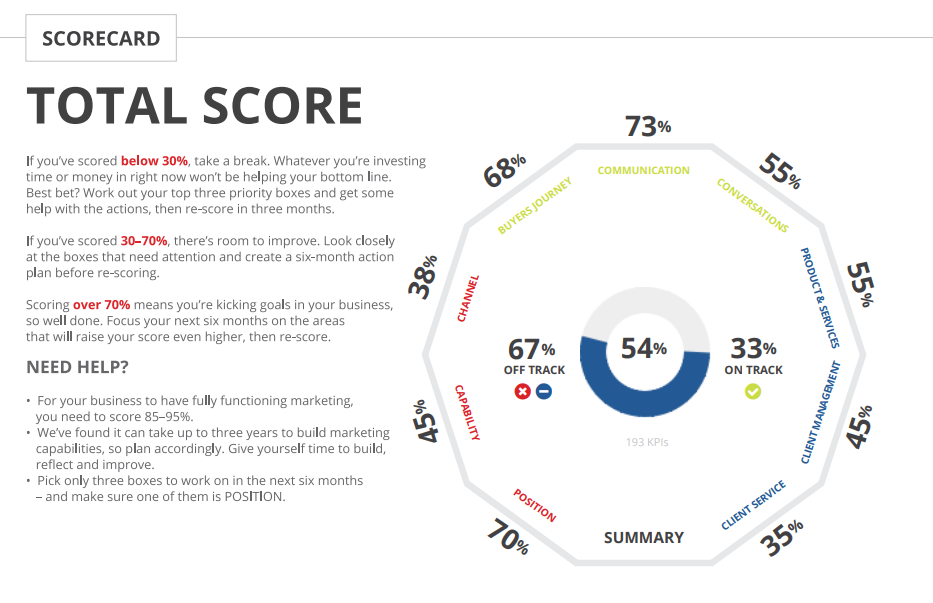“Why Do Some Businesses Grow” Part 3
This week I will share with you about the importance of Marketing Skills within a business. Marketing skills & a Marketing Plan are critical to your business success.
Improving your business systems (Part 1), Leadership skills in your business (Part 2), The importance of Marketing (Part 3), Available Capital in Business (Part 4)
For clarity I am talking about street smart marketing skills and a cohesive, integrated, well thought out marketing plan that aligns with your businesses strategic and operational objectives.
Most business owners acknowledge the importance of these skills on an intellectual level. Yet when one examines their business, the picture is often very different.
Why is this so?
Well the reasons are many and varied and include:
- Business is family run and they may not have the expertise to identify the businesses requirements in the marketing area.
- The view of marketing is restricted to a limited number of media or channels e.g. Yellow Pages and TV ads.
- The “marketing budget” is insufficient or “does not really exist or worse is seen as an overhead instead of an investment to further growth and profitability
- There is no cohesive, well thought out marketing plan. It’s just fly by the “seat of the pants” decision making.
So you may ask, “Well Tibor, where do I start? I feel so overwhelmed and it seems such a big task.”
I recommend developing a Marketing Plan.
The purpose of this plan is to develop strategies and tactics to sell your product and services to your target market.
There are many important elements of a good Marketing Plan.
These include (list not meant to be exhaustive):
- Your Goals
- Your Unique Selling Proposition (USP) or Unique Buying Advantage (UBA)
- Your Target Market – do you know who they are?
- Market Research – this should underpin/confirm the strategies and tactics you propose. Your research should include the qualitative and quantitative. Remember – the numbers tell a story and they don’t lie!
- Articulating the Benefits (not just features) to your target market
- Your Competition – who are they, what are they doing & what can you learn from them?
- Your Marketing Tools – how will you promote your company, product and services to your market? Will you use networking, telemarketing, direct mail, media (paper, radio, TV) advertising, Press Releases; E-Newsletters etc
- Your Marketing Budget: important because it helps you monitor and control your investment. (As an aside many companies allocate far too little to their marketing budget or worse still don’t have appropriate measures in place to monitor results of various campaigns)
- Your Sales Channels – will you use in-house sales force; distributors; an online business etc
- Your Merchandising: are you creative and adventurous (market maker) or a dull and boring (market follower). [Research indicates that 77% of impulse sales can be traced directly to merchandising]
- Your Pricing: are your prices appropriate. My experience tells me that many businesses are doing themselves no favours in this area.
- Your Positioning: how is your business perceived by your target market, your staff (& importantly your sales team) and/or your competition? Cheap, expensive or great value for money. Are you happy with how you are perceived or is their work to be done in this area?
Phew? I can hear some of you say – that’s a lot of work.
Indeed, a good marketing plan is not thrown together overnight. In fact it should be a “living document” and one that is constantly being reviewed. Why? Well since your marketplace is constantly changing must your strategies and tactics then be constantly reviewed in light of these changes? In fact market makers often anticipate or create the demand in the marketplace for their goods and services.
[An excellent thought provoking book about “demand creation” among other things is, “Unlimited Wealth” by Paul Zane Pilzer.]
So if you need help in this area stick up your hand and ask. After all, you would be far better concentrating on what you are good at and maximizing the return on it – rather than trying to do it all yourself
Now for a laugh
(Thanks to Noel Whittaker for this gem!)
Dan was a single guy living at home with his father and working in the family business. When he found out he was going to inherit a fortune when his sickly father died, he decided he needed a wife with which to share his fortune.
One evening at an investment meeting he spotted the most beautiful woman he had ever seen. Her natural beauty took his breath away. ‘I may look like just an ordinary man,’ he said to her, ‘but in just a few years, my father will die, and I’ll inherit $20 million.’
Impressed, the woman obtained his business card and three days later she became his stepmother.
Women are so much better at estate planning than men.
Next time I will talk about an important part of business, namely available capital and it’s importance in business growth.
Lets connect


